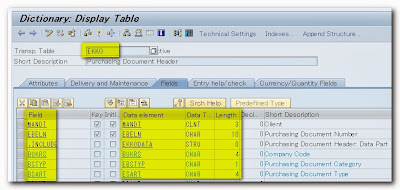Here's the Part 4 of this compiled ABAP questions. Enjoy answering. You can view the first four parts in this link:
A: Adding technical settings to the table
B: Checking the table syntax
C: Saving the table
D: Activating the table
82. Within the ABAP program attributes, Type = 1 represents:
A: INCLUDE program
B: Online program
C: Module pool
D: Function group
E: Subroutine pool
83. If this code results in an error, the remedy is:
SELECT fld1 SUM( fld1 ) FROM tab1 INTO_
A: Remove the spaces from SUM( fld1 ).
B: Move SUM( fld1 ) before fld1.
C: Add GROUP BY f1.
D: Change to SUM( DISTINCT f1 ).
84. Which keyword adds rows to an internal table while accumulating numeric values?
A: INSERT
B: APPEND
C: COLLECT
D: GROUP
85. Assuming itab has a header line, what will be output by the following code?
READ TABLE itab INDEX 3 TRANSPORTING field1.
WRITE: /1 itab-field1, itab-field2.
A: The contents of the third row's itab-field1.
B: The contents of the third row's itab-field1 and itab-field2.
C: The contents of the third row's itab-field2.
D: Nothing.
86. The following code indicates:
SELECTION-SCREEN BEGIN OF BLOCK B1.
PARAMETERS: myparam(10) type C,
Myparam2(10) type N,
SELECTION-SCREEN END OF BLOCK.
A: Draw a box around myparam and myparam2 on the selection screen.
B: Allow myparam and myparam2 to be ready for input during an error dialog.
C: Do not display myparam and myparam2 on the selection screen.
D: Display myparam and myparam2 only if both fields have default values.
87. Which statement will sort the data of an internal table with fields FRUIT, QTY, and PRICE so that it appears as follows? FRUIT QTY PRICE
Apples 12 22.50
Apples 9 18.25
Oranges 15 17.35
Bananas 20 10.20
Bananas 15 6.89
Bananas 5 2.75
A: SORT itab DESCENDING BY QTY PRICE.
B: SORT itab BY PRICE FRUIT.
C: SORT itab.
D: SORT itab BY PRICE DESCENDING.
88. Which keyword adds a line anywhere within an internal table?
A: APPEND
B: MODIFY
C: ADD
D: INSERT
89. To read a single line of an internal table, use the following:
A: LOOP AT itab. _ ENDLOOP.
B: READ itab.
C: SELECT SINGLE * FROM itab.
D: READ TABLE itab.
90. Which Open SQL statement should not be used with cluster databases?
A: UPDATE
B: MODIFY
C: DELETE
D: INSERT
91. To include a field on your screen that is not in the ABAP Dictionary, which include program should contain the data declaration for the field? A: PBO module include program
B: TOP include program
C: PAI module include program
D: Subroutine include program
92. This flow logic statement is used to make multiple fields open for input after an error or warning message.
A: GROUP
B: FIELD-GROUP
C: CHAIN
D: LOOP AT SCREEN
93. Given:
PERFORM subroutine USING var.
The var field is known as what type of parameter?
A: Formal
B: Actual
C: Static
D: Value
94. Are Programs client dependent?
A: Yes
B: No
95. Which interface controls what is shown in the PC?
A: Presentation Interface
B: Application Interface
C: Database Interface
D: Operating system Interface
96. Which work process triggers database changes?
A: Update Work Process
B: Enqueue Process
C: Online Process
D: Database Process
97. How many transport request types are there?
A: 1
B: 2
C: 3
D: 4
98. What are the function modules generated upon creating a lock objects?
A: Enqueue and Dequeue
B: Lock and Unlock
C: None of the above
99. Can you use if-then-else statement in Sapscript?
A: Yes
B: No
100. Can you call subroutine of one program to another program?
A: Yes
B: No
A: 1
B: 2
C: 3
D: 4
98. What are the function modules generated upon creating a lock objects?
A: Enqueue and Dequeue
B: Lock and Unlock
C: None of the above
99. Can you use if-then-else statement in Sapscript?
A: Yes
B: No
100. Can you call subroutine of one program to another program?
A: Yes
B: No





No comments:
Post a Comment